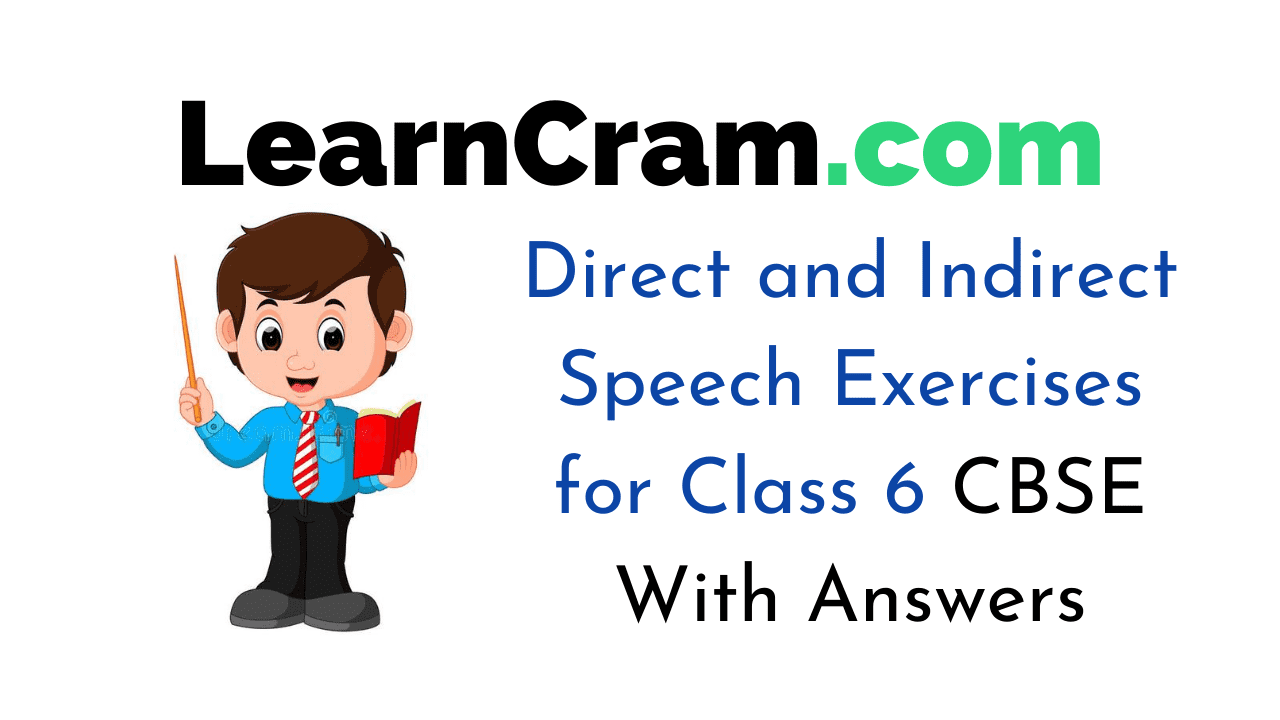When we use the exact words of the speaker, it is called direct speech. Indirect or Reported Speech refers to a sentence reporting what someone has said.
Basic English Grammar rules can be tricky. In this article, we’ll get you started with the basics of sentence structure, punctuation, parts of speech, and more.
Direct and Indirect Speech Exercises for Class 6 CBSE With Answers PDF
When we do not quote the exact words of a speaker while we report what he/she said – it is known as reported speech.
There are two parts of speech – Reported Verb (R.V.) and Reported Speech (R. S)
She says, “I like gold fish.”
(R.V.) (R. S.)
The sentence in the question tag is called Direct speech. The sentence without the question tag is called Indirect speech.
When the Reporting verb is in present tense or future tense then there will be no change in reporting speech except in the change of pronouns, place and time of expression.
Example:
- He says, “I write poems.”
- He says that he writes poems.
While converting ‘Direct’ into ‘Indirect’ Speech pronouns, tenses, place and time of expression are to be considered.
To convert direct speech into indirect speech ‘that’ conjunction is used to join the reported verb to reported speech.
The pronouns of the direct speech are changed to indicate the relations with the reporter and the hearer. The formula for converting pronouns of Direct speech
Remember this equation = RV/RS = Son/123 = S = Subject, O = Object, N = No change
- If the RS is in first-person, it shall be changed according to the ‘Subject’ of the RV.
- If RS is in second-person it shall be changed according to the ‘Object’ of the RV.
- if RS is in third-person then there will be no change.
Example:
Indirect:-She says that her dad likes roasted chicken.
Place, demonstratives and time expressions:-Place, demonstratives and time expressions change if the context of the reported statement (i.e. the location and/ or the period of time) is different from that of the direct speech.
In the following table, you will find the different changes in place; demonstratives and time expressions.
| Direct Speech | Reported Speech |
| Time Expressions | |
| today | that day |
| now | then |
| yesterday | the day before |
| … days ago | … days before |
| last week | the week before |
| next year | the following year |
| tomorrow | the next day / the following day |
| Place | |
| here | there |
| Demonstratives | |
| this | that |
| these | those |
“These dresses are not suitable for the at the occasion,” says Ditya. “We need to wear some traditional clothes like salwar – kameez on this occasion,” says Ditya.
The modal verbs could, should, would, might, needn’t, ought to, used to do not normally change.
Example:-
- He said, “She might be right.”
- He said that she might be right.
Other modal verbs may change:
| Modal | Direct speech | Reported speech |
| Can | “I can do it.” | He said he could do it. |
| May | “May I go out?” | He wanted to know if he might go out. |
| Must | “She must apply for the job.” | He said that she must/had to apply for the job. |
| Will | “They will call you.” | He told her that they would call her. |
Universal truths remain unchanged in reported speech.
Example:
- The guru said, “The sun rises in the east.”
- The guru said that the sun rises in the east.
Direct and Indirect Speech Worksheets for Class 6 CBSE
A. Read the dialogues given below and change it to indirect speech.
1. Harish: “Poonam is at home.”
Harish said (that) _____________
2. Karan: “Learners often read a book.”
Karan told me (that) _____________
3. Suman: “I’m watching TV.”
Suman said to me (that) _____________
4. Simran: “Kanu was ill.”
Simran said (that) _____________
5. Palak: “The girls helped in the house.”
Palak told me (that) _____________
6. Roma: “I am going to ride a skateboard.”
Roma said to me (that) _____________
7. Ronnit and Kajal: “We have cleaned the windows.”
Ronnit and Kajal told me (that) _____________
8. Harshit: “I didn’t have time to do my homework.”
Harshit remarked (that) _____________
